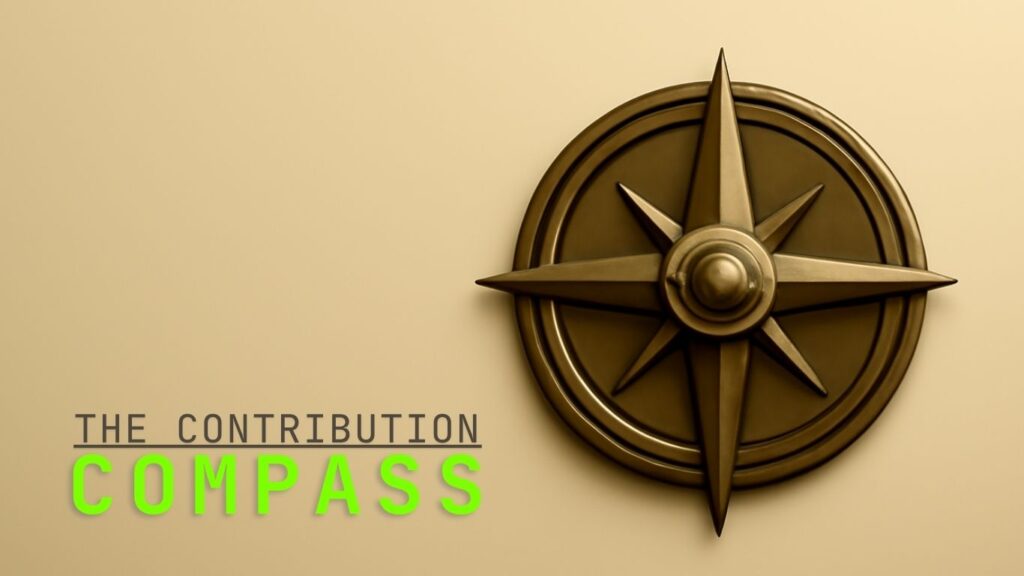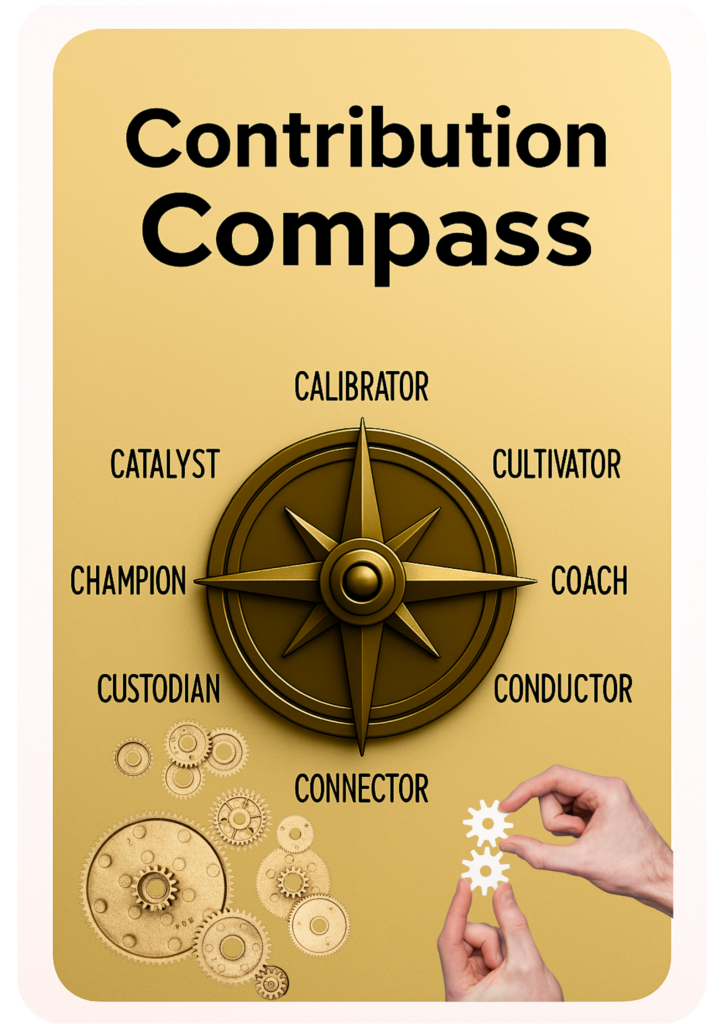Win at Life
What it is
The Contribution Compass is a profiling tool designed to help you understand how you naturally make a difference – at work, at home, or anywhere you spend your time and energy.
It breaks contribution down into eight types or ‘profiles’. Each one reflects a different style of adding value, working with others and solving problems.
There’s no ‘best’ profile – they’re just different, and each has its place.
(Although everyone I’ve spoken to secretly thinks theirs is the best.)
Understanding where you sit on the compass can help you make better (and quicker) decisions about how you spend your time, reduce friction with others, and do more of what comes naturally to you.
Why is this useful?
(in and out of the workplace)
Understanding how you contribute ‘in the wild’ can benefit your life both in and out of the workplace. It explains why some tasks get you excited, while others quietly drain your will to live. It helps you stop committing (or overcommitting) to roles that don’t suit you.
It also helps you appreciate what other people bring to the table, without the green-eyed monster rearing its head, or wondering why their way of doing things drives you berserk.
If you’re part of a team, it can stop people from having unrealistic expectations of you. If you work from home or run your own business, it can help you structure your day. You can work in a way that plays to your talents and strengths, rather than constantly grinding through tasks you dislike.
Mostly, it’s a helpful tool for bringing your natural strengths to the table, without having to force things.
In the spirit of ‘how you do anything is how you do everything’, these profiles aren’t just useful at work.
Knowing your contribution profile means it’s easier to know what to say yes (or no) to. Whether it’s helping out at your village event, organising your five-a-side team, volunteering as a school governor, or planning the Starbucks rota.
N.B. We had both ‘Clipboard Clara’ and ‘Raffle Raquel’ at my children’s junior school, both of whom were genuinely living their best life at Christmas and summer fetes. (Genuine names, sometimes I check in with people to make sure I’m not making this stuff up).
As we all contribute in different ways, the Contribution Compass helps you recognise what your way looks like.
Take a look below – you might spot yourself straight away, or recognise someone you work with or live with.
The Contribution Compass: 8 Profiles
Catalyst – Accelerating Change
Catalysts spark ideas and energy.
They’re quick to start projects, love to innovate, and often lead with enthusiasm.
They do best in fast-moving environments.
They are great at kickstarting projects, but can need help getting things over the finish line.
Champion – Rallying Support
Champions thrive on excitement and engagement.
They bring people together, promote ideas, and create momentum.
They do best when they’re given a cause to shout about.
They may lose interest once things settle.
Coach – Nurturing Growth
Natural coaches support others to grow. They ask the right questions, create space for reflection, and elevate others.
They’re natural listeners with a strong sense of intuition.
They can sometimes give too much of themselves and lose sight of their own needs.
Connector – Building Bridges
Connectors know how to find the right people for the job.
They have a sharp eye for building relationships and the networks that make things happen.
They’re collaborative, people-focused, and bring opportunities together.
They may spend more time networking than delivering.
Custodian – Holding Steady
Custodians are loyal, grounded and consistent.
They take care of structure, routine, and follow-through.
They’re the ones who quietly keep everything running.
They may not seek the spotlight, but they’re often the backbone of the team.
Cultivator – Growing the Long Game
Cultivators adopt a sure-but-steady, measured approach.
They see long-term potential and invest in it patiently.
They’re planners, nurturers, and supporters of sustainable growth.
They can be slow to get started, but they are strong in the long run.
Conductor – Coordinating Performance
Conductors like systems that work.
They organise, streamline, and manage moving parts so they run smoothly.
They prefer structure and clarity.
They can feel stressed when others are too chaotic or vague.
Calibrator – Fine-Tuning for Precision
Calibrators are detail-focused and calm.
They refine processes, spot mistakes before they cause problems, and quietly improve what already exists.
They’re often the reason things don’t fall apart.
They may struggle in noisy or unstructured settings.
Real Life Examples
Calibrator
The friend who always spots the typo in the school newsletter before it goes out.
Because they’re detail-focused, precise, and help improve things quietly.
Coach or Custodian
The manager who calms everyone down when the meeting starts going off the rails.
Depending on their style:
If it’s calming through emotional attunement, that’s what the Coach does.
If it’s more about keeping structure and routine on track, that’s Custodian.
Conductor or Custodian
The person who doesn’t want the mic or to be in the photo, but remembers everyone’s birthday, brings snacks, a first aid kit, and checks the weather for everyone else.
They quietly hold the system together and anticipate everyone’s needs, without needing recognition.
Things to Think About
-
- Which profile sounds most like you?
-
- Does it change when you’re in a state of flow? When are you forcing it?
-
- Are you downplaying your contribution style simply because it feels easy or natural to you?
-
- Are you trying to Hulk-smash your way through tasks that don’t fit your strengths?
Optional Challenge
This week, take note of moments when you felt in flow.
Try mapping those moments to one of the profiles.
Then notice when things felt clunky or resistant.
What was happening?
A Buddh-ish Take
“When you plant lettuce, if it does not grow well, you don’t blame the lettuce.
You look for reasons… You never blame the lettuce.”
– Thich Nhat Hanh
Not everyone contributes in the same way.
Some people are loud and lead from the front, others are quiet and consistent.
This quote shows us how useful it can be to stay curious instead of jumping to conclusions or dishing out blame, whether that’s towards ourselves or other people.
If someone doesn’t fit your idea of how contribution should look, it doesn’t mean they’re not adding value. It might just mean their strengths lie elsewhere, or they need different conditions to thrive.
We do better together when we understand what makes each of us tick and value the fact that we’re not all the same.
It’s those differences that make a group stronger, not weaker.
You can explore your full profile at contributioncompass.com. Carl Bates and Paul Avins developed this profiling model. The brief descriptions above are simplified and paraphrased for clarity and ease of understanding. For full details and the official wording, we recommend visiting their site. All credit for the Contribution Compass framework belongs to them, and further resources can be found on their site.










